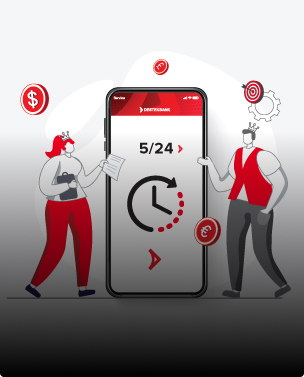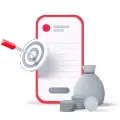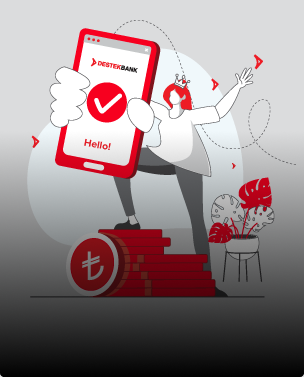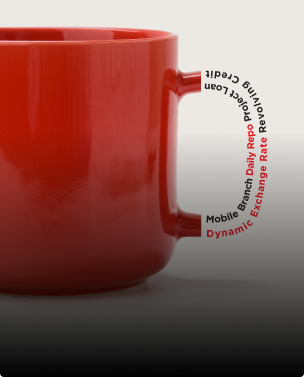Destekbank Digital Channels Security Measures
As Destekbank, we take many measures to ensure that you use digital channels in the safest way possible. You can see what these are below. In addition, you should also be very careful against fraudsters. For this, we kindly ask you to review the section titled "Fraud Methods".
Encryption: Our Bank's internet branch is protected by SSL 256 bit encryption system. With this security application, a secure connection is provided between your computer and our bank's systems.
Virtual Keyboard: A virtual keyboard is available for accessing our Bank's digital channels. We recommend that you use a virtual keyboard when entering information to protect yourself from malware such as keyloggers (applications that record your keyboard movements) or screenloggers (applications that record your screen movements).
Successful and Unsuccessful Login Records: You can see the last 10 records of successful and unsuccessful logins to Destekbank digital channels. In this way, you can track whether there is any login or login attempt to your accounts without your knowledge.
SMS Confirmation / Push Notification: After logging into our Bank's digital channels with two-factor authentication, pre-transaction confirmation notifications are sent as an additional security step, especially in transactions such as money transfers.
Automatic Notification About Transfers: You can manage your notification settings on our Bank's internet or mobile banking channels. These settings allow you to be automatically notified about transactions over the amount you specify in money transfer transactions.
Monitoring Purposes Only for Corporate Banking Customers: Our corporate banking customers can make use of our digital channel applications to monitor their accounts at the bank by specifying a user with monitoring authorization only.
Automatic Session Termination: When you log in to digital banking channels, you should never leave your screen alone. In such a case, others may make transfers to third parties or access your information from your open screen. When you do not make a transaction for a certain period of time while your session is open, your session is automatically terminated by the system.
Reporting of Fraud Attempts/Lost and Stolen: If you have been subjected to a fraud attempt or if your phone, password, ID has been lost or stolen, please call our Transaction Center at 0212 371 55 99 as soon as possible to close your digital channel access.
FRAUD METHODS
Take precautions against scammers
It is important that you take precautions against digital fraud methods and practices when using our corporate internet bank, which is offered to you to perform your banking transactions quickly and easily. First of all, you can read our information texts against fraud and take precautions with some simple steps in case you are faced with any fraud attempt.
How Do Scammers Try to Reach You?
Scammers may contact you over the phone, mislead you on social media platforms, manipulate you via email and text messages, or use more sophisticated tactics to impersonate your online and mobile banking services to obtain your information.
Phone Scammers
There may be fraudsters posing as lawyers, police officers, soldiers, prosecutors, bankers, etc., or pretending to be a friend or a company you do business with (malicious people pretending to be your friends or business partners whose accounts have been compromised, etc.). The purpose of these people is to carry out fraudulent activities by obtaining your electronic banking passwords, credentials or access information.
Scammers will try the following attempts to trick you into believing them;
- To gain your trust, they may give you external information or examples of your transactions.
- They keep you on the phone for a long time to distract you.
- They isolate you from possible prevention attempts by those around you by stating that you need to move to an environment where no one can hear you or your confidentiality will be revealed.
- They may contact you about a problem with your bank accounts or a refund.
- They tell you that they have discovered that you are associated with a criminal organization or that your bank account has been used by a criminal organization. They may ask you to transfer money, type in your card password and internet banking password, or tell them the mobile confirmation code sent via SMS for reasons such as securing your accounts, deleting your name, or fixing the problem.
- They may ask you to confirm your payment or bank account details in order to win a promotion or get a refund.
- They are in a hurry to persuade and offer unmissable deals, they may say that the offer is only valid for you.
Precautions Against Phone Scammers
- In calls made by our Bank, information such as internet/mobile banking password, mobile confirmation code transmitted via SMS, credit card password, identity details are never requested.
- Public officials and bank employees cannot ask for your personal or financial information or request you to transfer money.
- If you encounter such a situation, do not give any information to the caller and hang up the phone.
- Be careful never to use answers such as "Yes" and "OK", which can be used as voice confirmation, to the other party who asks you to confirm by saying your name, address, etc.
- Never call back the number that called you.
- In this and similar situations, we kindly ask you not to respond to people who ask you to share your information.
- Never share passwords with people who call you and ask you to tell them the password, stating that the password came to you by mistake.
Social Media Scammers
Social media scammers try to reach you through various social networks such as Facebook, YouTube, Twitter, WhatsApp, Messenger. They create fake accounts in the name of your relatives, friends or you and ask for money through different scenarios by taking advantage of your proximity status.They may create fake campaigns, fake social media posts and advertising links using the title and logo of our Bank.These scenarios usually include emergency messages such as accidents, hospital and education expenses and similar emergency messages.
Precautions Against Social Media Scammers
- Ignore fake campaigns organized through social media and all kinds of communication platforms using our Bank's title and logo.
- Never click on advertising links and never share any information through these links.
- Do not respond if you are contacted through fake social media accounts belonging to your family, friends or acquaintances.
- Do not share your account information, passwords or transfer money with anyone, even if they are on your friends list.
- Remember that no bank will ask you for your information or contact you through a social media account.
- Check the "Privacy" and "Security" settings of all your social media accounts. Make sure that you have taken all the actions specified for your security. Repeat the check periodically.
- Remember that intermediary banks will not be responsible for any money transfers you make to fraudsters with your own consent.
E-Mail, SMS and Social Media Scammers
It is a type of fraud that captures security-critical information by creating an environment of trust through e-mail, SMS or social media and then redirecting to a fake website after clicking on the shared link. Frauds carried out in this way are also commonly known as Phishing.
- Giving the impression that it was sent by our Bank;
- "Your Internet Banking has expired."
- "You can log in to our Bank's mobile banking application here."
- "Suspicious transactions have been detected from your credit card/account."
- "Log in, win a car"
- "Money has entered your account, click to log in",
- They use phrases like "Your account has been blocked, click here to remove it".
- If you click on these links, they can lead you to fake websites and bank accounts and cause you to share critical information.
Precautions Against E-Mail, SMS and Social Media Scammers
Fraudsters use the bank name with minor changes in the fake accounts they open or in the links they send via e-mail and SMS. Do not forget to check the shared links for missing letters, extra letters or errors.
Our Bank does not request information updates via e-mail or SMS, nor does it share a link to the internet branch login page.
Never click on the links in the messages received via e-mail and SMS.
When you log in to the Internet Branch, check the name field in the security certificate and check whether the security certificate really belongs to Destek Yatırım Bankası A.Ş.
Internet and Mobile Device Fraudsters
Viruses, malware, trojans, etc. aim to capture your personal and financial information (internet banking password, mobile confirmation code transmitted via SMS, etc.) by infecting your computer or mobile phone.
In order to install these malware on your device, they may send e-mails, SMS messages, or even WhatsApp messages that appear to be sent from banks, public and private institutions and contain files (with extensions vbs, .bat, .exe, .scr, .jar, .xls, .doc, .js) and links.
Precautions Against Internet and Mobile Device Fraudsters
- Do not download apps from app stores whose security you are not sure of. Take care to download applications from official markets (Google Play, AppStore). Do not install applications from untrusted or unknown sources on your computer or mobile device.
- Pay attention to the permissions that new applications you install on your mobile device want to access. In particular, do not allow the installation of applications from unknown sources and do not allow those who request administrator permission (admin) for your phone.
Use licensed operating system, software and antivirus programs and keep them up-to-date.
- If your device is infected with a virus, we recommend that you seek support from your device's technical service.
- Do not open e-mails and attachments from people you do not know. Make sure that attachments are not opened automatically when you adjust your e-mail settings.
- Open files such as software, pictures, videos, etc. that you uploaded to your device from the Internet after running an anti-virus scan.
- Do not type the name of our Bank's institution in search engines and click on the links that appear as a result of the search. Instead, enter www.destekbank.com in the address bar. Please do not use the web pages you reach with another redirection.
- Your password is personal, do not share it with our bank employees and/or your relatives, and do not write it down anywhere.
- Remember that Destek Yatırım Bankası A.Ş. employees will never ask you to provide your internet branch password or passwords verbally, in writing, by phone, letter or e-mail.
- Remember that Destek Yatırım Bankası A.Ş. employees will never ask you to provide your internet branch password or password verbally, in writing, by phone, letter or e-mail.
- When you finish your transactions in the internet branch or mobile branch, end your session by using the "Log Out" "Secure Log Out" button.
- Do not perform internet banking transactions on computers belonging to others or accessible to others, such as internet lounges, public computers, workplace computers.
- Do not accept the offer of people who offer to help you by giving you their mobile devices.
If you have any suspicions about fraud, you can call our hotline at 0212 371 55 99 and provide information.
You may also benefit from the "Fraud Methods and Protection" guide of the Banks Association of Turkey, available at the link below.
https://www.tbb.org.tr/Content/Upload/Dokuman/7328/TBB-Dolandiricilik-Eylemleri-ve-Korunma-Yontemleri.html


Geri Invesment
Geri Digital Channels
Geri Payments
Geri Loans
Geri Invesment
 Foreign exchange transactions Foreign exchange transactions at Destekbank!
Foreign exchange transactions Foreign exchange transactions at Destekbank! Daily Repo Daily Repo transactions at Destekbank!
Daily Repo Daily Repo transactions at Destekbank! Forward Manage your currency risk with Destekbank Forward transactions!
Forward Manage your currency risk with Destekbank Forward transactions! Option Option transactions at Destekbank!
Option Option transactions at Destekbank! FX Swap FX Swap transactions at Destekbank!
FX Swap FX Swap transactions at Destekbank! Cross Currency Swap (XCS) Cross Currency Swaps at Destekbank
Cross Currency Swap (XCS) Cross Currency Swaps at Destekbank Interest Rate Swap (IRS) Interest Rate Swap Transactions at Destekbank!
Interest Rate Swap (IRS) Interest Rate Swap Transactions at Destekbank!Geri Investment Banking
Geri Digital Channels
Geri Payments






